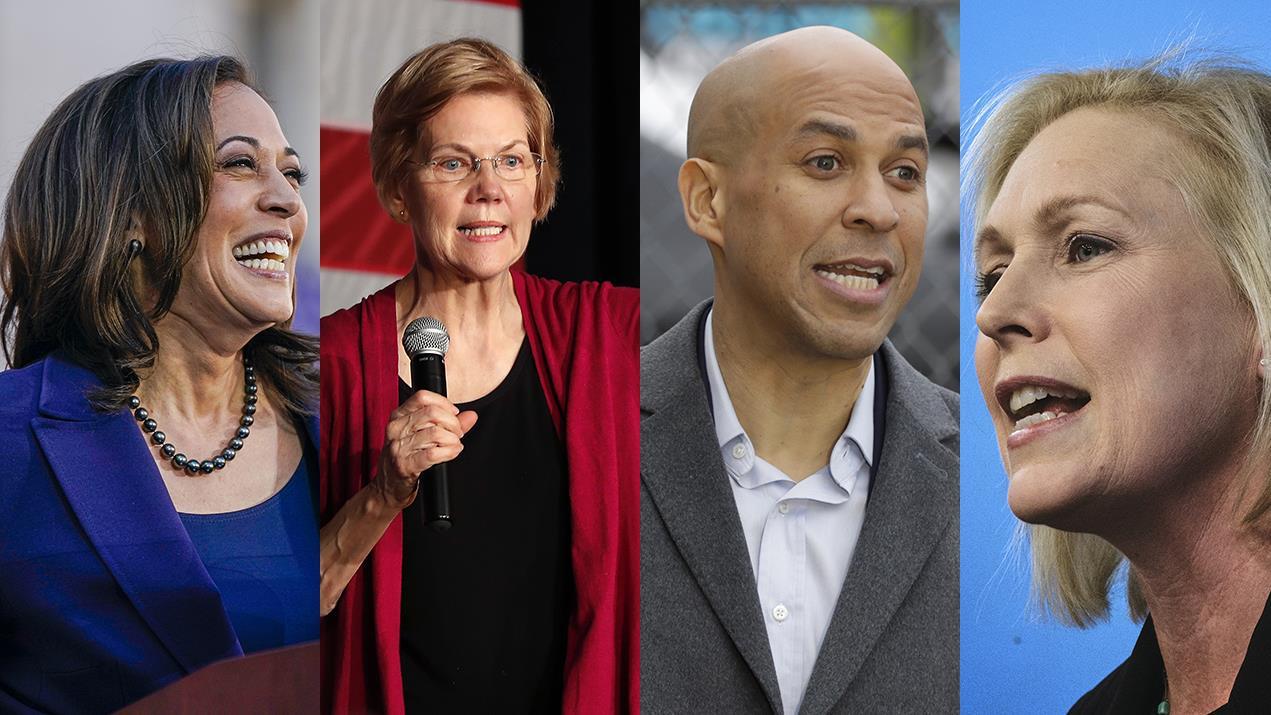Here's where 2020 Democrats stand on slavery reparations
As the 2020 race begins to heat up – 23 Democrats have already filed to run for president with the Federal Election Commission – some of the biggest talking points and policy debates are beginning to come into focus.
That includes the discussion of reparations for the descendants of slaves in the U.S., a policy that’s been addressed by several Democratic presidential hopefuls – a marked turn from previous election cycles. Both Hillary Clinton, the 2016 Democratic nominee, and former President Barack Obama opposed reparations.
The purpose behind reparations is to address racial inequality that’s lingered in the country; for instance, a study by the Pew Research Center in 2017 found that the median income of white households is $171,000 -- 10 times that of black households ($17,100).
Although critics argue that reparations are impractical to calculate how to fairly distribute, a new paper published in the Social Science Quarterly estimated it could cost between $5.9 trillion and $14.2 trillion. The author of the paper calculated that number based on the number of hours all slaves worked in the U.S. from when the country was officially established in 1776.
On Wednesday, as the policy begins to gain traction ahead of the presidential election, the House held its first discussion in a decade on reparations for the descendants of slaves, debating H.R. 40, which calls for a commission to “study and consider a national apology and proposal for reparations for the institution of slavery, its subsequent de jure and de facto racial and economic discrimination against African-Americans.”
Testimony in favor of reparations came from several witnesses, including actor Danny Glover and writer Ta-Nehisi Coates, the author of “The Case for Reparations” and Sen. Cory Booker -- a Democratic presidential candidate.
Here’s a closer look at what the New Jersey Democrat and some of the top Democratic presidential candidates have said about reparations.
Cory Booker: Booker supports reparations, and during the hearing on Wednesday, laid out his reasoning in a passionate testimony, questioning whether the U.S. was “truly free from the historically rooted and hideous legacy of slavery.”
“I believe right now, today, we have a historic opportunity to break the silence, to speak to the ugly past and talk constructively about how we will move this nation forward,” he said.
Booker also introduced a Senate companion to H.R. 40, according to his website, garnering 12 co-sponsors from his colleagues.
Elizabeth Warren: The Massachusetts senator was one of the 12 co-sponsors of Booker’s Senate bill (which calls for a study of reparations -- not reparations). To be sure, however, Warren has said she supports the federal government issuing reparations to black Americans who were affected by slavery.
“We must confront the dark history of slavery and government-sanctioned discrimination in this country that has had many consequences including undermining the ability of Black families to build wealth in America for generations,” Warren, said in a statement to Reuters in February.
Bernie Sanders: Sen. Sanders, like Warren, also co-sponsored Booker’s bill. But he’s also hesitated publicly about whether to back reparations. In March, during an interview with ABC’s "The View," the Vermont independent shied away from pledging his full support.
“I think what we have got to do is pay attention to distressed communities: black communities, Latino communities, and white communities, and as president, I pledge to do that,” Sanders said when asked about the issue.
“I think that right now, our job is to address the crises facing the American people and our communities, and I think there are better ways to do that than just writing out a check,” he said in response to a question about whether he supported reparations in the form of money.
Kamala Harris: In April, Sen. Harris, D-Calif., said she supports a study on reparations (and, along with Sanders and Warren, co-signed Booker’s bill). However, she has been non-committal about whether she ultimately supports payments.
“When you are talking about the years and years and years of trauma that were experienced because of slavery, because of Jim Crow and because of all that we have seen in terms of institutional and legal discrimination and racism, this is very real and it needs to be studied,” she said during a CNN town hall in April. “And we need to look at exactly how the response should be played out.”
Joe Biden: The former vice president remains an outlier among the top, progressive Democratic candidates as he has not voiced support for reparations, nor has he endorsed H.R. 40.
“[Biden] believes that we should gather the data necessary to have an informed conversation about reparations, but he has not endorsed a specific bill,” a spokesperson told Vice this week.
Julian Castro: Former Housing and Urban Development Secretary and San Antonio Mayor Julián Castro was one of the first presidential candidates to say he would consider reparations for black people in the U.S.
“I’ve long believed the country should consider reparations because of the atrocity of slavery,” Castro said in March. “I also believe that we’re never going to fully heal as a country from the racial divide until we’ve addressed the tremendous wrong that was done with slavery.”
CLICK HERE TO GET THE FOX BUSINESS APP
If president, Castro said that he would create a commission or task force to determine the best course of action for reparations.




















